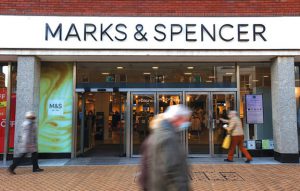Bloomberg
Britain’s surging inflation is squeezing profit margins at Marks & Spencer Group Plc’s (M&S) food division as the premium supermarket chain absorbs some cost increases to maintain sales.
The business, which has been the company’s growth driver in recent years, was faced with 11% inflation in its cost of goods in the first half, while its online joint venture with Ocado Group Plc recorded a loss as demand reverts to in-store shopping. Marks & Spencer shares fell as much as 7%.
It’s the first earnings report under new Chief Executive Officer Stuart Machin and co-CEO Katie Bickerstaffe, who took over earlier this year from Steve Rowe. M&S warned in May that the cost-of-living crisis and an exit from Russia would prevent profit from rising this year.
M&S is still working through a turnaround after more than a decade of attempts to jumpstart the business. The biggest tasks are tackling the company’s expensive store portfolio, boosting online sales and staying competitive in clothing after being dismissed as old-fashioned,
ill-fitting and pricey.
“Our mandate is clear: step up the pace, accelerate change and drive a simpler, leaner business and invest in growth opportunities,†Machin said on a call with reporters.
M&S is planning for a “material contraction†in demand in the market next year, though it said its customers may prove resilient as they have on average slightly higher incomes and are older. Last week the company said it was locking prices on more than 100 supermarket items until the end of January as it tries to compete with cheaper grocers that are gaining market share.
“Next year looks tough,†said Chief Financial and Strategy Officer Eoin Tonge. “The cost of doing business is going to get higher because of energy, it looks like the consumer is going to be struggling with the continued cost of living crisis and also higher interest rates.â€
M&S’s clothing and home unit, which has struggled of late, did better than food, with a 14% sales gain. The division has gained market share and grown in profitability, even as adjusted pretax profit fell by 24% across the whole business. The majority of M&S’s fashion offering isn’t highly discretionary, said Bickerstaffe, with large sales of pyjamas, underwear, tights and school uniforms, items that are still needed by shoppers even as income falls.
Still, the retailer said it’s deferring any decision about restarting a dividend to closer to the year-end, having skipped a payout to shareholders for two years.
The stock has lost half its value this year.
Like some of its rivals, M&S has boosted employee pay twice this year and is offering other incentives to staff including free meals and M&S vouchers.
M&S is speeding up an overhaul of its stores with 67 of its bigger shops set to close within potentially three years instead of five. The business is planning to open 100 new format food stores with better access including parking.
The retailer is looking to demolish and rebuild its Marble Arch store in London and, despite political opposition, its controversial plan has recently secured the backing of Selfridges and Ikea, which have large plots nearby.
The business suffered a blow to its top team in July when it was announced that Tonge is leaving to join Associated British Foods Plc, the owner of Primark.
 The Gulf Time Newspaper One of the finest business newspapers in the UAE brought to you by our professional writers and editors.
The Gulf Time Newspaper One of the finest business newspapers in the UAE brought to you by our professional writers and editors.
